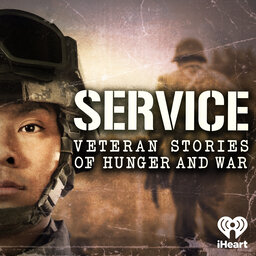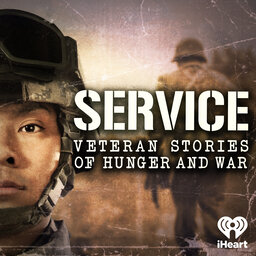


Service: Veteran Stories of Hunger and War
Playlist by Service: Veteran Stories of Hunger and WarHow do our food stories change during wartime? Each episode follows a veteran or wartime volunteer from their home in the United States through their overseas deployment and back again. We hear firsth…Follow the podcast:
18 clip(s) in playlist

So, What Did World War II Change, Really?
It’s called “the deadliest conflict in human history” for a reason. World War II engulfed the lives of soldiers and civilians in a way those in the United States have not experienced in a near capacity since. In the final episode of our season exploring the experience of service during World War …
29:31
They Were Fond of Sweets
World War II transformed women’s service both in the U.S. Armed Forces and in their stateside communities -- millions would serve at home and abroad as nurses, clerics, drivers, front-line food peddlers, and even pilots. The work wasn’t easy. To survive the shifting job market, they had to work twi…
23:50
He Lied to Get in the Marines… Then World War II Broke Out
100-year-old World War II Marine veteran Norman Rubin remembers the Great Depression. He remembers eating as much as could be put on a plate in front of him as a hungry kid. He remembers his father leaving at 10 years old and his brothers working to help his mother. He remembers reading about how t…
23:19
All’s Fair in War... and Lasting Love
Every veteran we’ve sat with this season has gushed about the “love of their life” -- the woman who worked hard at the hospital or factory or office or homestead and dutifully penned letters while they were away in the Service. They’ve wowed us with not only their love’s origin story, but the lifet…
24:15
Navy Cooking at 110$
Wait, but how did the food get made in World War II? In this episode of Service, Navy veteran Ray Boutwell shares how he cooked at a training camp in New Jersey toward the latter part of the war: what equipment they had in the kitchen, what dishes they made regularly, and the difference between in…
23:01
We Were Treated Like Kings
The majority of the veterans we’ve heard from this season recall growing up in Great Depression poverty. Such is not the case with Robert Hanson, a Navy Lieutenant whose father found himself in an intriguing position of economic strength that helped Robert settle into Ivy League academia by the sta…
29:19
When You Look Like the Enemy
Think success in farming has nothing to do with sacrifice on the front line? At the start of World War II, Japanese American farmers controlled 40% of California farm production, dominating crops like tomatoes, celery, and snap beans made newly available nationwide with the success of refrigerate…
39:05
"Dad, I Can't Talk About It" Part 2
Why do some of our veterans not speak about their service experience, and how can civilians help? On the second half of this two-part episode, we explore the some racial healing 70-years post war, and how food brings veterans out of their shells. We first explore how one community event brought two…
20:55
“Dad, I Can’t Talk About It.”
Many of the World War II combat veterans we’re hearing from this season didn’t talk about their service experiences for most of their lives. On the first of this two-part episode, we explore the history behind why they might not have opened up, how things have changed with time, and what’s helped t…
21:48
Farming for the Front Lines
6 million men left farm life between 1940 and 1945. Some, like Air Corp Staff Sergeant Harold Bud Long, left to join the Service. Setting out and maintaining 47 air strips across Europe, Bud took part in legendary campaigns like Omaha Beach on D-Day, the Battle of the Bulge, and Patton’s drive th…
24:51
 Service: Veteran Stories of Hunger and War
Service: Veteran Stories of Hunger and War